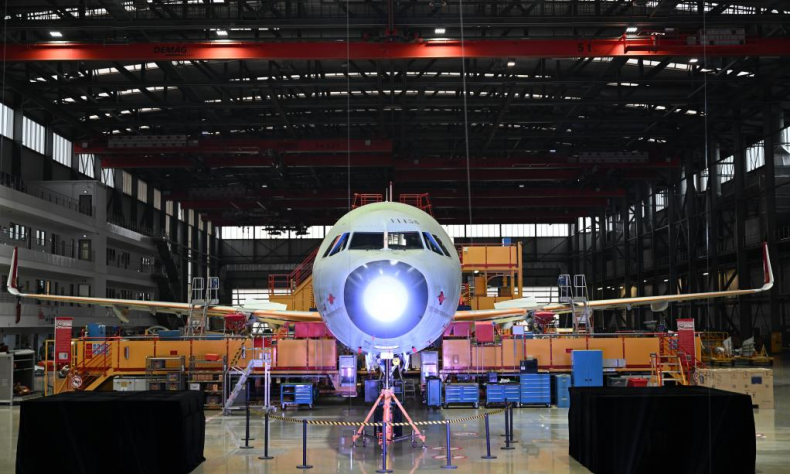France-China Ties Demonstrate the True Spirit of Cooperation

Neither France nor Europe will benefit from the escalation of the ‘Cold War’ mentality sought in some American foreign policy circles. France-China ties build goodwill, geopolitical certainty, stability, and, as such, peace, representing the best interests of humanity.
French President Emmanuel Macron’s visit to China last week has proven to be a politically significant event. During the trip, Macron affirmed the importance of ties between the two countries, calling for “lessening France’s dependence on the United States” as well as not being a “follower” of America into “conflicts that aren’t ours.” Calling for European strategic autonomy, the visit was accompanied by a delegation of French business leaders who signed a plethora of deals in Beijing, including the construction of a new Airbus factory to double the aviation firm’s output in China.
France proves that cooperation with China can work and can be “win-win.” Although France is, on paper, an ally of the United States, a member of the European Union, and, likewise, NATO, its leadership has long understood the importance of being an autonomous geopolitical force that carves out its own place in the world, not just for France itself, but for Europe. In doing so, it has highlighted the fundamental importance of cooperation, pragmatism, and engagement as key values in international relations, as opposed to a focus on ideology, coercion, bloc confrontation, and a “Cold War” mentality.
What the French leadership understands is that the United States, while technically a friend, does not represent the full spectrum of Paris’ national interests. Presently, U.S. foreign policy is seeking to tear up the current international order in order to forcefully reassert a hegemonic position over all other countries. In doing so, it is asking those that it calls “allies” to take sides and, against their best interests, is pushing them to make sacrifices to their own trade and economic development in the name of “strategic decoupling.” In asking its allies to cut off trade, technology, and energy ties with countries it deems as “competitors” to its own position of global dominance, the U.S. subsequently reaps benefits for itself.
France has been impacted in several negative ways by these policies. Firstly, the crisis in Ukraine has forced them to end reliance on Russian energy, which has led to surging inflation and price rises at home, which has been accompanied by domestic political unrest. Secondly, the U.S. has directly undermined French interests in several areas. The U.S.’s inflation reduction act, a comprehensive program of protectionism, hurts French industries and gives businesses not just in France, but throughout the continent, the incentive to relocate to the U.S. This has been particularly evident in the field of renewables and electric vehicles, among others. Likewise, U.S. anti-China policies have also undermined French defense industries, with AUKUS recently forcing Australia to scrap a submarine deal with France.

Because of this, France is aware that its own commercial interests are being actively undermined by the United States, and therefore it must act as a “quasi-competitor” to the U.S. in order to support itself. In doing so, China remains France’s largest and most critical export market. French leaders understand that the “decoupling” with China that the U.S. wants European leaders to undergo will undermine their own economic interests for the sole benefit of the United States; hence it is not always wise to “follow.” Airbus, after all, is a competitor to the U.S.-owned Boeing, and the deal to create a new factory within China means more sales. Therefore, this in turn means more exports to China and more jobs within the European supply chain for the company.
Simply put, neither France nor Europe will benefit from the escalation of the “Cold War” mentality sought in some American foreign policy circles. China may represent a different ideology and a different geopolitical “perspective,” so to speak, but its inherent value as a partner and the practical reality of needing to cooperate with China far outweighs ideological dispositions. Given this, the China-France relationship must be a model for how European countries engage China, namely under the logic of “strategic autonomy” as opposed to “strategic capitulation” to American interests. China is not in any way a threat to Europe or its interests but rather provides an engine of growth and opportunity for European enterprises. Both parties have so much to gain from working together.
While this does not mean France and China will see eye to eye on everything, it is ultimately the sentiment, the attitude, and the overall results that count. France-China ties build goodwill, geopolitical certainty, stability, and, as such, peace, representing the best interests of humanity. They also demonstrate a new path, a way that is smarter, better, and more beneficial than the reckless foreign policy of the United States.
 Facebook
Facebook
 Twitter
Twitter
 Linkedin
Linkedin
 Google +
Google +







